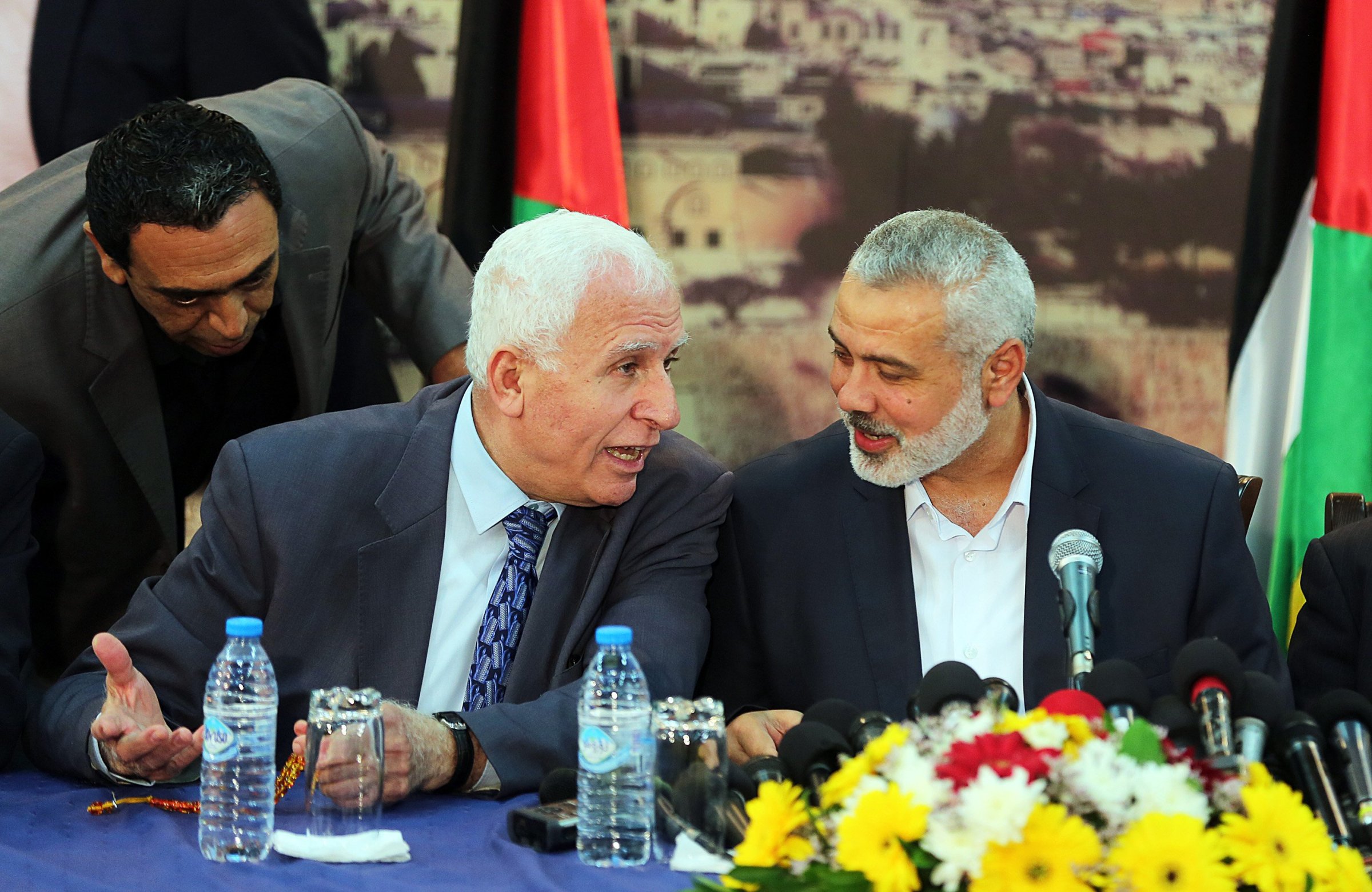
There’s no shortage of reasons to be skeptical of the reconciliation agreement signed on Wednesday between Hamas and Fatah, the rival Palestinian political factions that split the Gaza Strip and the West Bank between them seven years ago — ending any practical semblance of Palestinian national unity. Twice since 2011, the parties have grandly announced similar “historic pacts” that would supposedly end the rift, and neither has amounted to much: the militant Islamists of Hamas still govern Gaza, the moderate nationalists of Fatah hold sway in the West Bank.
“No, it’s not real,” says Abdullah Zeud, 28, who owns a computer store in Ramallah, in the West Bank. “It’s just like every meeting these guys have held in the past, which ends up with them fighting and not agreeing on anything. They continue to hold their meetings, bring the Palestinian people’s hopes up, and then it all ends up with them disagreeing over everything”
“It is becoming a joke,” says Im Issa, 52, a Ramallah housewife. “Why is this happening now? Is it because they have found themselves going nowhere with the negotiations and want to try and put pressure on Israel?”
It could be. The timing of the announcement, six days before the April 29 deadline for U.S.-sponsored peace talks, suggests Palestinian Authority President Mahmoud Abbas, who heads Fatah, may have chosen to push back against pressure from Israel and the U.S., which Palestinians see as insisting on new concessions. Israeli Prime Minister Benjamin Netanyahu was angered by the latest announcement, declaring, as he did after the previous pacts, that Abbas “must choose. Does he want reconciliation with Hamas, or peace with Israel?”
By appearing to choose Hamas, Abbas wins points with the Palestinian public (which strongly opposes the factional rift), while perhaps also driving a wedge between the Americans and Netanyahu. “Is he hoping this will raise alarm bells in Washington, and they’ll go back to the Israelis and say, ‘We’ve got to offer him something’?” asks Mouin Rabbani, a senior fellow at the Institute for Palestine Studies. “Yes, the timing is suspicious.”
But Rabbani also sees evidence that the new pact may well be more credible than those that came before. Both factions, he notes, have lately been weakened — Fatah by the trajectory of the peace talks, Hamas by a cascade of political bad news. First Hamas lost its headquarters in Syria, triggering a sharp drop in financial support from Iran. Even worse was the military’s July 2013 overthrow of the Muslim Brotherhood government in Egypt, which largely sealed off Gaza’s last remaining open border; the new Egyptian regime declared Hamas a terrorist group.
There’s also the photos of the signing ceremony, which took place in Gaza City. The earlier pacts were inked in Cairo and Doha, and championed by Hamas’ chairman, Khaled Meshaal, who travels the Middle East as a kind of roving ambassador. Both pacts were opposed by Hamas leaders trapped in Gaza — the very Hamas officials beaming with their arms in the air on the dais on Monday.
“The opposition in the past was from the Gaza-based leadership,” Rabbani says, “and this time those are the ones who are signing.”
Significantly, the pact is structured to avoid forcing together the rival parties. It calls for installing a technocratic government in five weeks’ time, which will prepare elections in six months. Meanwhile, Fatah will continue to govern the West Bank through the Palestinian Authority, and Hamas will rule Gaza. In theory, at least, it could work. And some even believe it will.
“From the things I’ve been hearing on the news today, it really sounds as though the two parties are really serious this time,” says Mohammad Ali, 35, a construction worker in the West Bank city of el-Bireh. “I think that the two parties have realized that they don’t have any more options, the negotiations have not achieved anything, and they need to unite with one another in order to confront Israel as one people united with common goals and objectives.”
But as Rabbani points out, and as the last two pacts announced with no less fanfare made clear, “Signing is one thing, and implementation is another.”
— With reporting by Rami Nazzal / Ramallah
More Must-Reads From TIME
- What Student Photojournalists Saw at the Campus Protests
- How Far Trump Would Go
- Why Maternity Care Is Underpaid
- Saving Seconds Is Better Than Hours
- Welcome to the Golden Age of Ryan Gosling
- Scientists Are Finding Out Just How Toxic Your Stuff Is
- The 100 Most Influential People of 2024
- Want Weekly Recs on What to Watch, Read, and More? Sign Up for Worth Your Time
Contact us at letters@time.com